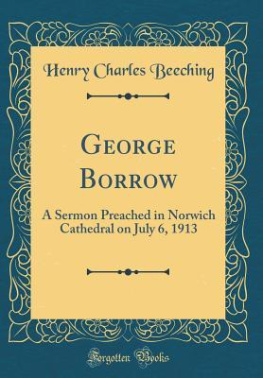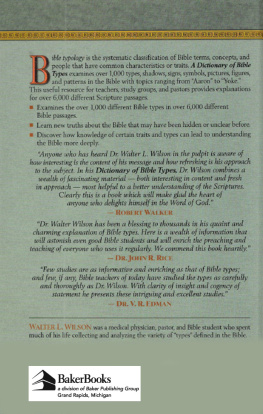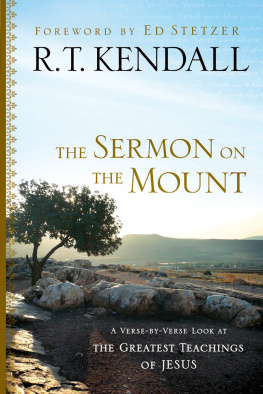The Project Gutenberg eBook, George Borrow, by Henry Charles Beeching
This eBook is for the use of anyone anywhere at no cost and with
almost no restrictions whatsoever. You may copy it, give it away or
re-use it under the terms of the Project Gutenberg License included
with this eBook or online at www.gutenberg.org
Title: George Borrow
A Sermon Preached in Norwich Cathedral on July 6, 1913
Author: Henry Charles Beeching
Release Date: June 8, 2007 [eBook #21776]
Language: English
Character set encoding: ISO-646-US (US-ASCII)
***START OF THE PROJECT GUTENBERG EBOOK GEORGE BORROW***
Transcribed from the 1913 Jarrold & Sons edition by David Price, email ccx074@pglaf.org. Many thanks to Norfolk and Norwich Millennium Library, UK, for kindly supplying the images from which this transcription was made.
GEORGE BORROW
A SERMON PREACHED IN
NORWICH CATHEDRAL ON
:: :: JULY 6, 1913 :: ::
by
H. C. BEECHING, D.D., D. Litt.
dean of norwich
london
JARROLD & SONS
publishers
As for me, I would seek unto God, which doeth great things and unsearchable; marvellous things without number.Jobv. 8.
You may desire some explanation of why we in this Cathedral, have thought it right to take part with the city in the public commemoration of George Borrow. It is not, of course, merely because he was a devoted lover of our ancient house, though for that we are not ungrateful. Nor again is it merely because he was for the most active years of his life a zealous servant of the Bible Society; and our Church has taken a special interest in that society since the day when Bishop Bathurst, first of his episcopal brethren, appeared upon its platforms side by side with Joseph John Gurney. Nor again is it merely because he was an accomplished man of letters. Religion and literature indeed have much that is common in their purpose. The Church exists to propagate a certain interpretation of the world and human life. Literature also exists to interpret life, and the great literatures of the world have never in their interpretations shown themselves antagonistic to religion; on the contrary, they have always tended to discover more and more elements of permanent value in human life, confirming the Churchs message of its Divine origin and destiny. But, unhappily, there have always been, and are still, men of letters whom the Church cannot honour, because their books, although technically meritorious, take a view of life which is in our judgment against good morals, or in some other way mischievous. If, then, we in this Mother Church claim our share in the commemoration of George Borrow, it is because he was, as we think, a true seer and interpreter; because he opened to us fresh springs of delight in the natural world; because he aroused new and living interest in the lives of men of many kindreds and tongues; and because he held up to our own nation an ideal of conduct which could not but benefit those whom it attracted.
Let me, as shortly as I can, remind you of some characteristics of that ideal.
Every reader of the Old Testament is familiar with the two great types which the early Israelitish civilisation sets before us again and again in Cain and Abel, Isaac and Ishmael, Esau and Jacobthe contrast of the wild and vagabond hunter and the plain man, dwelling in tents. These types as they appear in the Bible have in them a characteristically Semitic element, but they have still more of our common humanity. We observe the two types among our own children, and it is a contrast that interests us all. Our affections perhaps go out to the romantic Esau rather than to his business-like brother; while at the same time we recognise that the future of civilisation must lie not with the child of impulse, but with him who can forecast the future and rank something higher than his momentary whim. It was this fundamental contrast that was so interesting to Borrow. He studied it in the cities and in the wildernesses of this and many other lands; and because he studied it he was not content to accept the easy verdict of civilisation that finds nothing but profanity in Esau, or the equally easy paradox of a return-to-nature philosophy, which finds all virtue in the noble savage. Borrow studied Esau in his wandering life with interested eyes, and won his confidence and a glimpse of his secret; and he studied Jacob in his counting house and workshop with no less understanding, if with a less degree of sympathy; and then he exhibited to his countrymen an ideal which at the time vexed and disquieted them, because there were elements in it drawn from both.
Look first at those which he drew from his intercourse with the gipsies. He was puzzled by the problem of their wonderful persistence. What could be its cause? Their faults were proverbs. They lived by drawing fools into a circle and cheating them. Stealing and lying were first principles in their code of life. And yet because Borrow held that Nature did not forgive faults, much less allow men to profit by them, he could not but ask whether those gipsies were so thoroughly vicious as was supposed. One day, in a conversation with a gipsy girl under a hedgeone of the strangest talks in the chronicle of literaturehe elicited the fact that domestic honour was held among them to be a primary law, and female unchastity an unpardonable offence. And he left that conversation on record for our admonition. That, you will say, is no new ideal to English women. As an ideal, no. But our English practice is something very different. And we have lived to see literature challenge even the ideal.
And then there was the secret, an open one indeed, but hidden from many Englishmen of Borrows generation, though it had been recently proclaimed by the gentle and thoughtful poet who lay buried in Borrows native town of Dereham, that though civilisation arose from life in cities, yet the joy of life was apt to escape the city liver. The vagabond gipsy had something which man was the better for having, a delight in the sun and air and wind and rain. We in Norwich are not likely to forget those magical words put into the mouth of the gipsy on Mousehold Heath, Theres night and day, brother, both sweet things; sun, moon, and stars, brother, all sweet things; theres likewise a wind on the heath. Life is very sweet, brother. Allied with this love of nature was a keen satisfaction in manly exercises, walking, riding, boxing, swimming, which Borrow contrasted somewhat scornfully with the baser sports of dog fighting and cock fighting, then in vogue among gentlemen. And as a consequence of this love of the open air and the open country Borrow found in the gipsies a sense of freedom and independence, and so a self-respect, which he compared unfavourably with the mingled arrogance and servility of many city-bred people.
Here then we have some of the elements of the ideal, largely drawn from the despised gipsies, which Borrow held up before his generation. He does not indeed promulgate it as the whole duty of man, though we who have learned the lesson may think he is apt to over-emphasise it. He does not ignore other qualities of manliness. He holds that from the root of a self-respecting freedom, if the environment be but favourable, as with the gipsies it was not, other manly qualities will spring. From the strength of self-respect should spring the courage of truthfulness, and justice, and tenderness, and perseverance. On the love of truth and justice I need not dwell; they are conspicuous in every page that Borrow wrote. Perseverance is still more emphasised, because it was the main contribution of Jacob to the human ideal, the quality most lacking in Esau. Tenderness may seem to be less evident; and I know it is a common opinion that Borrows ideal of life was too self-absorbed to allow of much sympathy with others. I think this view is mistaken. There was undoubtedly a strong stress laid on the duty of protecting ones own life and personality from outside influence, and a corresponding stress on the duty of respect for the independence of others; but where there was a claim, whether of blood, or friendship, or need, Borrows ideal admitted it to the full. I have wished to confine myself this morning to the ideal of conduct which Borrow offers us in his books, because it was a conscious and reasoned ideal, and he wrote to propagate it. The question how far he himself attained to his own standard we are right in passing by unless there was any conspicuous contrast between his theory and his practice. But there was no such contrast. So far as our information goes, Borrow lived by his ideal resolutely. His truthfulness and perseverance and love of justice cannot be questioned; and on the point of tenderness it is not those who knew him besthis mother, or his wife, or his friendswho have found him wanting.








